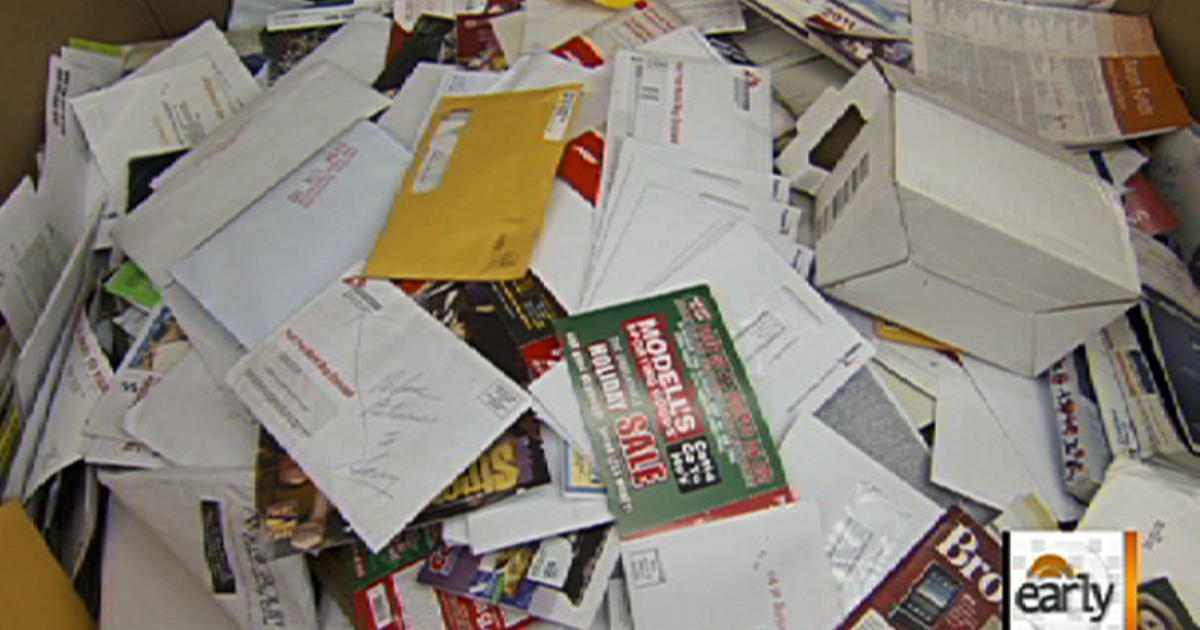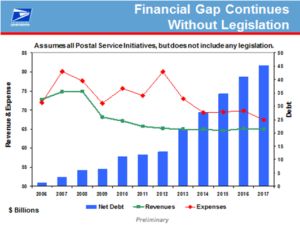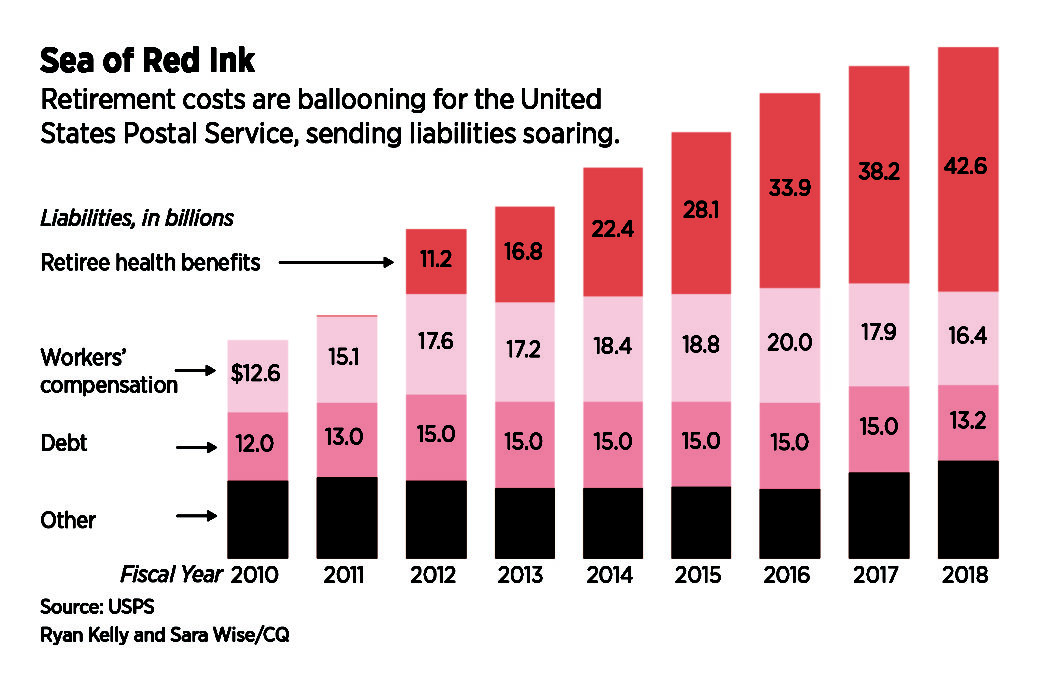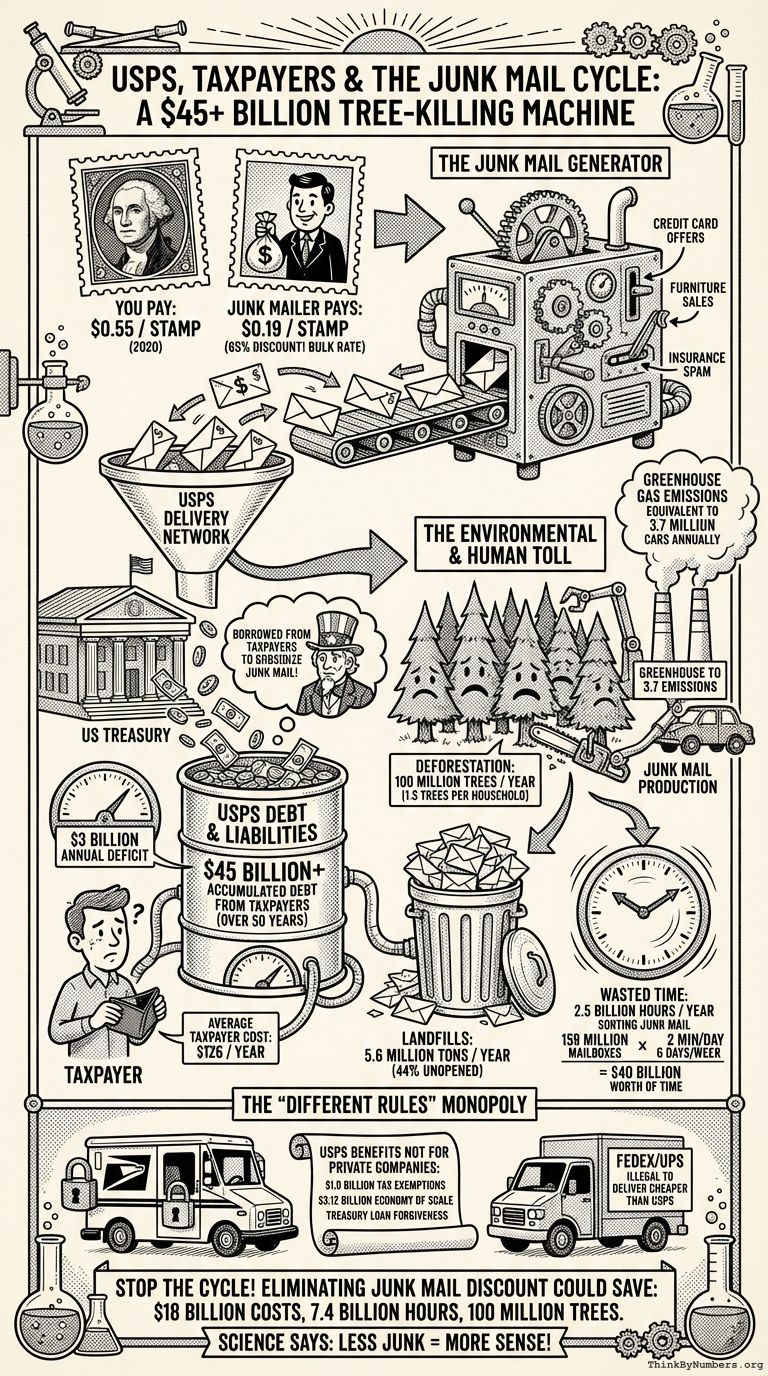As of 2020, the cost to you for a stamp is $0.55. Junk mailers enjoy a 65% discount as the USPS bulk mail rate given to them is only $0.19.

The United States Postal Service fulfills a very important mission. Everyone benefits from it and all postal workers deserve our thanks.
Especially the junk mailers, who benefit the most. They get to mail you things you don't want for 65% off, which you then throw away, which kills trees, which you pay for. It's a beautiful circle of life, like The Lion King, except with more credit card offers and fewer singing meerkats.
Billions from the US Treasury Used to Artificially Lower Prices
$3 Billion in Annual Deficits
Over the last 50 years, the USPS has charged around $3 billion less each year than it cost to deliver the mail. To provide these artificially lower prices to junk mailers, it’s had to borrow around $3 billion each year from taxpayers.

$45 Billion in Accumulated Debt
Some of this debt was repaid with surpluses in the 1990s, but for the most part, these deficits have accumulated to over $45 billion.

$143 Billion in Debt & Unfunded Liabilities
USPS’s total unfunded liabilities and debt were $143 billion at the end of the fiscal year 2018, an amount double its annual revenue.
Much of the inevitable upcoming addition debt is from a demographic spike in retirees and their promised benefits.

USPS Efforts to Transfer Over $100 Billion in Liabilities to Taxpayers
Declining revenues in the amount of physical mail sent and increased pension payouts make it nearly impossible that this debt to taxpayers will be repaid. As a result, efforts are underway to completely transfer this $100 billion in retirement costs to the backs of taxpayers.
USPS has sought legislation that would integrate its retiree
health program with Medicare, which would significantly reduce its total
unfunded liabilities.
Congressional Efforts to Transfer USPS Debt to Taxpayers and Increase Borrowing
The House’s $2.5 trillion coronavirus relief package would send $25 billion to the Postal Service in emergency funding and eliminate the Postal Service’s $11 billion debt. The measure would reset the Postal Service’s borrowing limit to $15 billion and eliminate an annual $3 billion borrowing cap.
This effort at complete forgiveness of debt failed to survive through the passage. Instead, it included an additional (likely unrepayable) $10 billion loan for the Postal Service.
However, Representative Connolly stated that there will be continued effort to transfer the debt to taxpayers. “It needs debt forgiveness, not debt extension,” Connolly told NPR.
It's Illegal For a Private Service to Deliver Mail More Cheaply Than the USPS
The United States Postal Service (USPS) enjoys a complex series of financial subsidies and tax advantages over private delivery services such as FedEx and UPS. Indeed it has been made illegal for a private company to deliver a letter to your mailbox at a rate lower than the USPS.
The USPS has a monopoly on your mailbox, which is illegal when companies do it, but legal when the government does it. This is called "different rules," which is Latin for "we make the rules so we win."
Hence, they enjoy many economies of scale benefits that come with being a monopoly. Despite this, it still runs a $4.2 billion-per-year deficit that has to be covered by the taxpayer via the US Treasury.
These benefits not enjoyed by its private counterparts include:
- direct subsidies and congressional appropriations
- US Treasury-provided borrowing subsidies and loan forgiveness
- $1.0 billion in broad tax exemptions
- $3.12 billion in the economy of scale advantages derived from its monopoly on delivering letters
The added cost of maintaining this monopoly equates to an $18 billion gift to the post office every year. There are 143 million taxpayers in the US. This means your annual USPS bill comes out to $126.
Mo’ Money, Mo’ Junk Mail
As of 2020, the cost to you for a stamp is $0.55. Junk mailers enjoy a 65% discount as the USPS bulk mail rate given to them is only $0.19.
In order for a bulk mail campaign to be worth doing, the bulk mailer has to make more money than it costs to send. Otherwise, they couldn’t afford to keep sending it. So there are a small number of suckers who pursue these offers they receive and the profit from them exceeds the $0.19/letter threshold. If direct mailers had to pay $0.55 per letter, the profit from the majority of junk mail campaigns would no longer exceed the cost of mailing threshold. Hence, you would get a lot less junk mail.
Eliminating this discount for bulk mailers could save:
- $18 billion increased costs of mailing
- 7.4 billion hours wasted sorting through it all (equivalent to $178 billion billed at $24/hour)
- 100 million trees
2.5 Billion Hours are Wasted Sorting Junk Mail Every Year
The average American spends about 2 minutes per day, 6 days per week sorting through junk mail. There are 159 million mailboxes in the US. This is 1 mailbox for every 2 people since people in households share a mailbox.
Before you complain about wasting 2 minutes per day, remember that those 2 minutes are giving you valuable information about credit cards you don't want and furniture sales you'll never attend. This is called "enriching your life," except the opposite.
2 minutes x 6 days x 52 weeks x 159 million mailboxes = 1.6 billion hours wasted sorting junk mail in the US every year.
The average hourly rate of pay in the US is $24.
1.6 billion hours x $24/hour = $40 billion worth of time wasted by junk mail each year.
Fun Facts About Junk Mail
- The American receives an average of 41 pounds of junk mail per year.
- 5.6 million tons of junk mail end up in American landfills every year.
- We spend eight months of our life sorting junk mail.
- American businesses sent 149 billion pieces of direct mail and nearly 10 billion catalogs in 2016.
- 5 percent of people respond to direct mail.
- Less than half of the mail even gets opened.
Environmental Effects of Junk Mail
- 5.6 million tons of catalogs and other direct mail advertisements end up in U.S. landfills annually.
- 44 percent of junk mail is thrown away unopened, but only half that much junk mail is recycled.
- The average American household receives 848 pieces of junk mail, which equals 1.5 trees every year and more than 100 million trees for all U.S. households combined. That’s the equivalent of deforesting all of Rocky Mountain National Park every four months.
- Largely due to deforestation, junk mail manufacturing creates as much greenhouse gas emissions annually as 3.7 million cars.
Calculations
The calculations for this post are available in a spreadsheet at https://docs.google.com/spreadsheets/d/1NxtJZHDUywmmSy9lJn0iX66YoukV_1-cDQet9sSwdUg/edit?usp=sharing. Feel free to make a copy, correct any errors, and email m@thinkbynumbers.org and I will update the post accordingly.


Comments